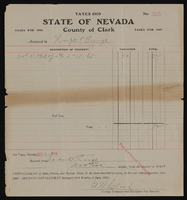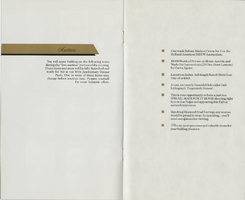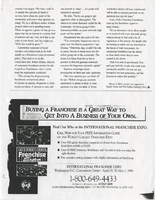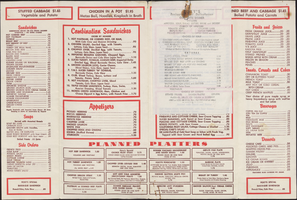Search the Special Collections and Archives Portal
Search Results
An Interview with Judith Lee Johnson Jones
Identifier
Abstract
Oral history interview with Judith Lee Johnson Jones conducted by Claytee D. White on February 22, 2007 for the Boyer Early Las Vegas Oral History Project. Johnson Jones discusses winning a contest that allowed her to be a showgirl at the Sands Hotel and Casino when she was seventeen, receiving a college degree in Houston, Texas, and performing in the Elvis movie “Viva Las Vegas.” She also talks about her twenty-nine-year career in education.
Archival Collection
Ethel S. Hatch oral history interview
Identifier
Abstract
Oral history interview with Ethel S. Hatch conducted by P. Kohlman on November 24, 1975 for the Ralph Roske Oral History Project on Early Las Vegas. This interview covers the history of Las Vegas from 1939 to 1975. Mrs. Hatch also talks about ranching in Nevada, Rex Bell, development on the Strip, the first hotels, and early local shopping culture. The interview concludes with discussion surrounding tree-lined streets, the Helldorado Club, and Fremont Street.
Archival Collection
Lee H. Lisby oral history interview
Identifier
Abstract
Oral history interview with Lee H. Lisby conducted by Glen E. Davis on July 10, 1975; Rita O'Brien on April 10, 1978; and Elizabeth Patrick on May 10, 1978 for the Ralph Roske Oral History Project on Early Las Vegas. In 1942, Lisby moved from Tallulah, Louisiana to Las Vegas, Nevada. Lisby talks about living conditions and work opportunities for African-Americans in Las Vegas.
Archival Collection
Jacqueline MacFarlane oral history interview
Identifier
Abstract
Oral history interview with Jacqueline MacFarlane conducted by Claytee D. White on February 04, 2010 for the Boyer Early Las Vegas Oral History Project. In this interview Jacqueline MacFarlane discusses her early childhood in Las Vegas, Nevada, her move to rural Nevada because of the Great Depression, her move back to Las Vegas, and meeting her husband David MacFarlane, an Air Force Cadet, at the Nellis Air force Base. She then discusses family life, Las Vegas in the 1950s and 1960s, and the various jobs she held on the Las Vegas Strip.
Archival Collection

Transcript of interview with Sari and Paul Aizley by Claytee D. White, November 4, 2016
Date
Archival Collection
Description
As Sari and Paul Aizley recall their separate childhoods and journeys to Las Vegas, their work and volunteer histories, their efforts to build a better society, and their life together they speak to each other as much as they respond to questions about their observations on the growth of the Las Vegas urban environment and their contributions to Southern Nevada's cultural development and a just society. In this interview, Sari and Paul speak to the cross-town commute and the physical UNLV campus in the late 1960s; the growth of the UNLV Math Department; the evolution of UNLV's Continuing Education; the State's North-South funding rivalry as reflected in the built environments of University of Nevada in Las Vegas and in Reno; plans to build a paleontology research facility at Tule Springs National Monument; the Review-Journal's "Ask Jessie Emmet" Real Estate column; local ACLU offices and politics; Fair Housing; transgendered persons; the Nevada State Assembly, and Class! magazine for Clark County high school students. Sari and Paul smile at each other as they recall how the editor/publisher met the bearded math professor and fell in love—despite the fact that they tell slightly different versions of their initial meeting(s). Sari passed away November 1, 2017, three days shy of one year after she participated in this interview.
Text

Nick Robone oral history interview: transcript
Date
Archival Collection
Description
Oral history interview with Nick Robone conducted by Claytee D. White and Barbara Tabach on December 21, 2017 for the Remembering 1 October Oral History Project. In this interview, Nick Robone, born and raised in Nevada, details his process of healing after being shot during the 2017 Las Vegas mass shooting at the Route 91 Harvest music festival. He discusses the events of that Sunday night and how he has learned to view life in a more positive light. Robone mentions various coping mechanisms that have helped him, including being open about his experience and talking about it with other survivors as well as pursuing his passions.
Text

Tax bills and receipts: Sadie George
Date
Archival Collection
Description
Text

Temple Beth Sholom 40th Anniversary Celebration invitation, April 23, 1988
Date
Archival Collection
Description
An invitation to Temple Beth Sholom's 40th anniversary celebration at the Alexis Park Resort in Las Vegas, Nevada.
Text


